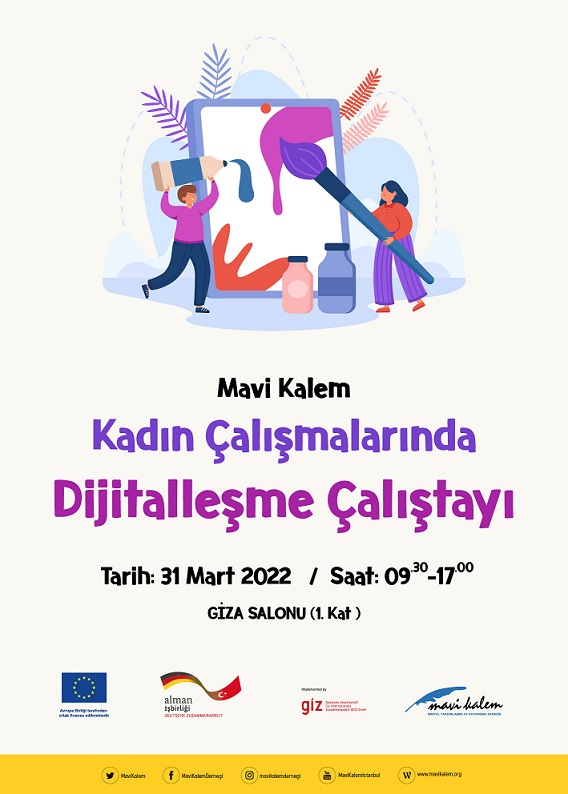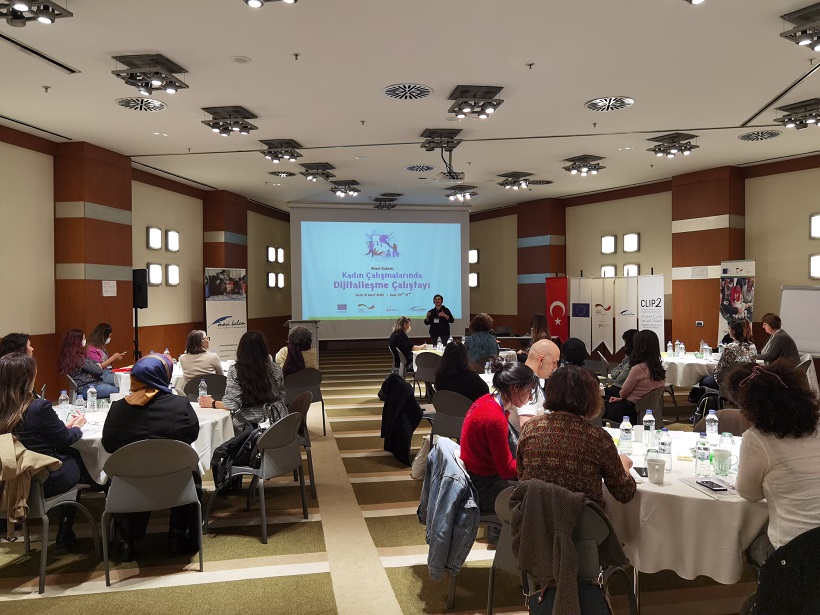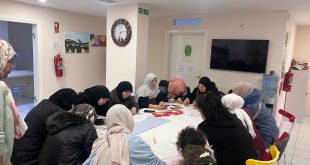Digitalization in Women’s Studies Workshop / 31 March 2022
We have seen that the use of digital tools in women’s studies cannot be considered in the same way as the use of digital tools in general. 
We organized a workshop on Digitalization in Women’s Studies. We had been planning this workshop for a long time to evaluate the impact of the Covid-19 pandemic on women’s studies. This meeting was important both to talk about what we learned in a crisis that we all experienced for the first time and to shape the future of our work. We came together with women from non-governmental organizations, local government units, public institutions and international organizations working with women.
In the first half of the workshop, there were presentations where we shared our experiences. Speakers evaluated the ways of working that changed with the pandemic, and the advantages and disadvantages of these new ways of working with women. The effects and changes of gender-based characteristics and sensitivities in the use of digital tools in women’s studies were discussed.
In the second half, we were divided into groups to work with the World Cafe technique. Thus, it was ensured that all participants could participate and contribute to different discussions. In the study, four discussion topics were discussed at four separate tables. All participants were able to sit at all tables and participate in every discussion.
World Cafe Discussions
In the first table, under the title of ‘pros and cons of working with digital tools for beneficiary women’;
the advantages and disadvantages such as accelerating women’s access to information while increasing the risk of accessing false information due to the information pollution; increasing women’s privacy concerns due to their participation in studies from home while at the same time increasing the participation opportunity of women who have to spend their time at home; remote working making it difficult to reach evidence about violence situations, as well as the privacy provided by digital tools (such as the option to turn off the camera, etc.) increasing the participation were discussed.
In the second table, under the title of ‘pros of using digital tools when working with women for practitioners’;
advantages such as facilitating access to women who live far away or who cannot leave their homes, being able to deliver the right information faster with the increase in the ability to use digital tools, and paving the way for new collaborations in women’s studies were discussed.
In the third table, under the title of ‘cons of using digital tools when working with women for practitioners’;
disadvantages such as the difficulty of providing confidence in women due to distrust towards digital tools, the difficulty of physical distance making it difficult to create a spirit of unity, the risk of data security and reliability of remote working, the difficulty of separating work and private life creating lack of self-care and burnout among practitioners were discussed.
Finally, in the fourth table, under the title of ‘pros and cons of using digital tools in terms of method in women’s studies’;
the advantages and disadvantages such as in addition to accelerating the work, excluding those who do not have technical means, the development of information methods such as online training on many subjects with the inability to effectively carry out activities that require physical interaction such as game and art therapies, the difficulty the digital tools created in official approval processes while at the same time allowing to overcome technical deficiencies such as language barriers and the instant sharing space they provided increasing the sharing of beneficiaries were discussed together.
We organized this workshop to evaluate the advantages and disadvantages of using digital tools in women’s studies. In this framework, we shared our experiences, observations and suggestions on structuring of digital tools based on gender-sensitivity, women’s access and participation, etc. The most important result of the workshop was that the use of digital tools in women’s studies cannot be considered in the same way as the use of digital tools in general. Using digital tools in working with women meant following these studies at every stage, evaluating them together with risks and sensitivities, and restructuring them along the way.
We would like to thank all the women who participated in the Digitalization in Women’s Studies Workshop and shared their experiences and ideas.
 Mavi Kalem Sosyal Yardımlaşma ve Dayanışma Derneği Hayata Rengini Kat!
Mavi Kalem Sosyal Yardımlaşma ve Dayanışma Derneği Hayata Rengini Kat!






